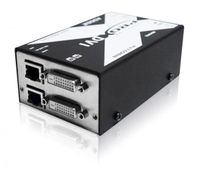Question: Hello, In the solution described on this page, DDX30 to DDX-USR user stations, is there a DDX-USR or another user station compatible with the DDX30 that would support dual monitors? Thanks
Answer: Thank you for your inquiry,
DDX transmitters & receivers (
DDX-USR) can be grouped to form user stations that support dual-head & quad-head connectivity. For example, DDX can be used to build a 5 users x 10 computer dual-head matrix. For modularity, multi-monitor set-ups are currently handled using multiple DDX-USR user stations - there isn't a separate dual-monitor user station.
You may also be interested in the IP-based Adder Infinity matrix solution which offers separate dual-monitor user stations.Question: Can you stack DDX30 and DDX10 together?
Answer: Thank you for your inquiry,
Adder DDX range isn't really designed for stacking / chaining of units. While this would be technically speaking possible by taking up 2 ports on each unit & with some software modifications (see below), for larger matrix based applications than DDX we would definitely recommend looking into the
Adder INFINITY solution instead which features the ability to create an unlimited end-point matrix.
Hardware Connections:
You can have a DDX-USR from one of the switches connected to a DDX-CAM from the other and vice versa. You won't be able to be directly connect one switch to the other but via this back to back method of USR to CAM module then you could achieve this.
 Software Modifications:
Software Modifications:- You will need to set a different "OSD Hotkey Modifier" for each DDX switch to prevent clashes in the OSD. Hotkey Modifiers allow you to pull up the On-Screen-Display and switch sources by using different hot key combinations for each switch.
- You are also at a risk of creating a loop but you can configure the access permissions for each USR to prevent this.
Again to be honest though,
we would not recommend this setup, and Adder would not support this for technical support.
Infinity would be a much cleaner solution and will be a lot less of a headache for the end user to actually use as a system without having to remember several keyboard combinations and which switch a source is connected to.







































